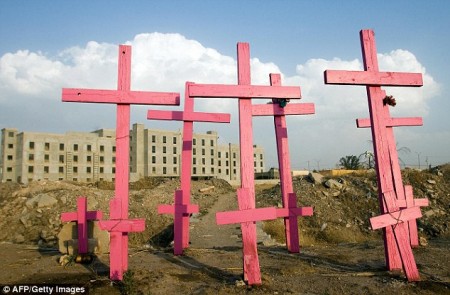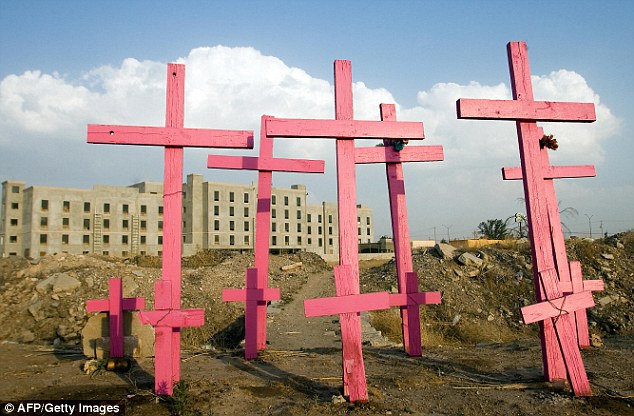Mexican prosecutors said Monday they are investigating claims that a woman who killed two bus drivers last week in this northern border city was seeking revenge for alleged sexual assaults of female passengers.
The claims made in an email from the self-styled ‘bus driver hunter’ echoed deeply in Ciudad Juarez, which has a grim history of sexual violence against women aboard buses.
A woman wearing a blond wig – or dyed hair – boarded one of the school bus-style vehicles that serve as transport in Ciudad Juarez on Wednesday morning.
She approached the driver, took out a pistol, shot him in the head and left the bus. The next day, apparently the same woman did exactly the same thing to another driver on the same route.
Over the weekend, media outlets began receiving emails from the address ‘Diana the hunter of bus drivers.’
‘I myself and other women have suffered in silence but we can’t stay quiet anymore,’ the email said.
‘We were victims of sexual violence by the drivers on the night shift on the routes to the maquilas,’ a reference to the border assembly plants that employ many residents in Ciudad Juarez, across the border from El Paso, Texas. ‘I am the instrument of vengeance for several women.’
The newspaper Diario de Juarez reported that a witness quoted the killer as telling the second victim, ‘You guys think you’re real bad, don’t you?’ before shooting him.
Authorities have not verified the authenticity of the email, or of a Facebook page set up under a similar name August 31.
But Arturo Sandoval, spokesman for the Chihuahua state prosecutors’ office, said the vigilante claim is considered one of the working hypotheses in the crimes. There was no apparent robbery involved in the killings.
‘Now that we have the email in the case file, it indicates that this could have been someone who had a run-in with a driver or one of his relatives,’ Sandoval said.
The government announced it will put undercover police aboard some buses and conduct weapons searches to prevent further killings, and said a citywide search for the suspect is already on.
‘We have a police sketch of the suspect and we are looking for her,’ municipal police spokesman Adrian Sanchez said.
Many of the women murdered during a string of more than 100 eerily similar women’s killings in Ciudad Juarez in the 1990s and early 2000s disappeared after boarding buses. Their bodies were often found weeks or months later, raped, strangled and dumped in the desert or vacant lots.
MEXICO’S CITY THAT HATES WOMEN…
Mexico’s Ciudad Juárez which sits on the border of the Rio Grande, just south of Texas, has not only become synonymous with a bloody drug war – but also for violence against women of horrific proportions.
The number of reported women murdered each year is in the hundreds; and hundreds more are reported missing.

Pink crosses mark the place where eight women were found murdered in Ciudad Juarez: The city has a terrible reputation for violence and sexual assault.
The murders hit their high in 2010, when 304 women were found dead. Media reports helped curb the violence against women but last year it was reported to be back just as bad.
By mid 2012 at least 60 women had been killed in the city, according to the New York Times and at least 100 were reported missing.
Human rights activists claim they fear people in Ciudad Juárez are not alarmed by the horrific violence against women because they think it is normal, it is so ingrained in the social culture.
The local government has made pledges to take the killings more seriously. However, it is often difficult to arrest, let alone prosecute in the city, according to campaigners.
Killings are the result of jealous husbands, jealous fathers-in-law, women killing women and other reasons, reports have said.
Organizations to aid the families of the missing women have sprung up in recent years, helping them band together to find out what happened to their mothers, daughters and sisters.
Several bus drivers were arrested in connection with those killings, but the cases against them always appeared weak, or their confessions coerced. One driver had his conviction overturned, and his co-defendant, another bus driver, died in prison before sentencing.
The head of the Chihuahua Women’s Human Rights Center, Lucha Castro, said that perhaps the killer ‘or someone close to her suffered some abuse by one of these guys.’
‘It’s a fact that there are sexual abuse cases on the bus routes, but it’s no greater than women disappearing from the streets in downtown, in human trafficking rings,’ Castro said.
But, she added, like the still-unresolved identities of most of the 1990s killers, ‘The most tragic thing is that the public may never know what the truth is.’






